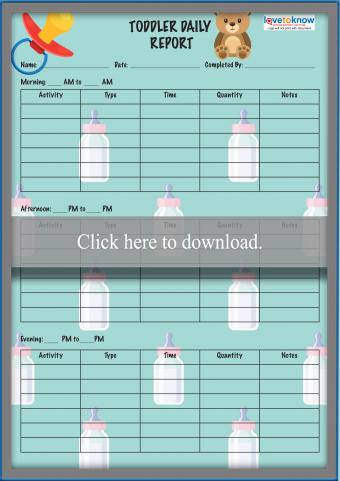
Using daily activity sheets for toddlers is a good way to keep track of everything your children do both when they are with you as well as when they are with another caregiver. If you need help downloading these printables, check out these tips.
Simple Toddler Daily Activity Sheet
Track one child's daily activities, meals, snacks, naps, and bathroom use on one simple chart. Parents and caregivers can write in up to four activities for each of the three main categories on this toddler daily report pdf.

All About My Day Toddler Form
This all about my day toddler form goes more in-depth than the simple chart and gives adults more freedom to add uncategorized information. Because the printable is more general and broken up by the time of day, it also works great as a preschool daily report template. Under "Activity" you can write in anything from free play to lunch then specify under "Type" whether it was educational, health-related, standard care, a group activity, or any other type. In the "Time" section you can list start and end times then under "Quantity" share the amount of food or the total time spent on the activity for example.

Two Ways to Use Activity Sheets
Daily activity sheets for toddlers can be used in two basic ways: you can leave the sheets 100% blank each day and let them be filled in or you can plan ahead by filling them out partially at the beginning of the week to help ensure variety over the course of the week. Use them to collect information and detect possible patterns in your child's behavior and sleep based on what he does during his day.
If on Sunday you fill out different activities for each day of the week and make a note of what should be eaten for lunch and snacks each day, you can introduce variety into the week instead of just hoping for it. Of course, if your child is at daycare, you may not have the option to tell the adults of the daycare which activities to do on which day. However, a good childcare provider will keep variety in mind when planning the daily curriculum and weekly menus.
Creating Information Pages for Toddlers
You can make your own activity sheets. This allows you to select the information and add any special notes about your child right onto the sheet, such as a severe allergy or other medical condition.
If a general sheet will suit your needs, plenty of daycare diaries are available to purchase at large book retailers. Check out the Daily Organizer by Julia Meehan or the Eat, Sleep and Poop Journal by Sandra Kosak. While these books are perhaps more appropriate for babies, they can be modified to accommodate toddlers as well.
Information on Daily Activity Sheets for Toddlers
Several types of information are commonly found on activity sheets for infants and toddlers. For toddlers, the games and things they did are important, as well as the nap times, what and how much they ate, and even their trips to the bathroom or diaper changes. If primarily daycare or pre-school providers and babysitters use the sheets, this is all information parents need at the end of the day. If the activity sheets are really only for you at home, you can leave out some of these categories of information.
- Activities: Whether your child has been coloring, watching TV, or playing at the playground, it's a good idea to know what he or she has done today and for how long (approximately). This is important for a few reasons: if you are home with your child all day, seven days a week, it is good to vary the activities of your child over the course of the week. If used by a daycare provider, you are able to keep track of what your child is doing when he or she is in another person's care. If you think that your child is watching too much television or not playing outside enough, you can address your concerns with the provider. In addition, if your child is extremely tired one night, it may simply be because he or she ran around the playground for a long time that day. Knowing what your child did can help explain his or her behavior during the evening and at bedtime.
- Meals and Snacks: Keep track of your child's eating in much the same way as you track activities. You can use the sheets to make sure that you offer a variety of healthy foods and not too many sweets or you can use the sheets to keep in touch with what your child is eating when outside your home.
- Naps: For toddlers, naps are still an important part of the daily routine. Knowing when your child naps can help you predict when nap and bedtimes will be. Likewise, when your child is at daycare, it is very likely that he or she has a different sleeping pattern than at home. Knowing these details can keep you current on your child's sleeping habits.
- Bathroom Trips/Diapers: For the youngest toddlers, diaper changes are good to keep track of, but are not as critical as for newborns and babies. For toddlers who are potty training, keeping track of their trips to the bathroom can help them be more successful. Asking frequently if your child needs to go to the bathroom is one of the best ways to increase awareness in your child, thereby promoting successful potty training.
Tracking Your Toddler's Day
Whether you make your own custom sheets, use the one included in this article or purchase a daycare diary, look at the information recorded on the sheets each day so that you can make adjustments and suggestions as needed, ensuring good health and wholesome activities for your toddler every day.







